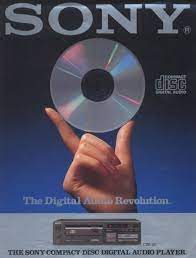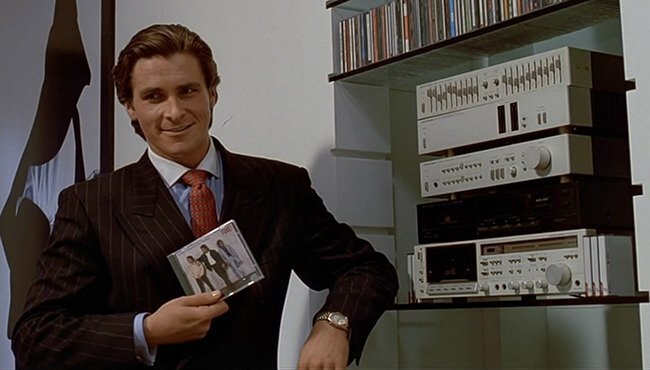Why CD’s are Undeniably Superior to Vinyl Records
Christian Bale, portraying homicidal investment banker Patrick Bateman, grins while holding a CD (image courtesy of Lions Gate Films.)
We live in a future that’s not so impressive.
Though we do not yet have the means to develop flying cars, a cure for cancer, world peace, time machines, soylent green, replicants, lightsabers, or self-lacing shoes, we do have access to one luxury that even the most brilliant minds of the past could not have anticipated: the power to stream music.
Digital streaming services such as Spotify and Apple Music have streamlined the process of listening to music, allowing their users to play any song from an ever-expanding library of recorded music with the tap of a button. While digital streaming is incredibly convenient, it does lack one component that many music fans would argue is integral to the listening experience: the sensation of touch. Our brains are wired to enjoy music, but they’re also wired to enjoy the feeling of holding it in our hands – that subtle combination of weight and texture that, for whatever reason, gives us an inexplicable sense of satisfaction. Thus a market for physical media still exists.

The two most popular physical formats for music in 2021 are the vinyl record (also known as LP) and compact disc. While compact disc sales have steadily declined over the past decade, vinyl has managed to make its way out of obscurity and back into public recognition to the extent that, in 2020, American consumers made the mistake of spending more money on records than on compact discs. The reasons behind this new surge in the popularity of defunct technology are unclear; is it some form of postmodern, self-deprecating irony? Or, are people just unaware of the compact disc’s inherent superiority?
That’s right – except in the matter of being a better waste of resources, CDs outclass their ancestors in every regard.
When comparing vinyl and compact discs, most consumers will be the most immediately concerned with how the two formats differ in price. The price for vinyl records, which were previously low, have begun to skyrocket as a result of their regained relevance; new LP releases are typically priced above thirty dollars, and deluxe editions and reissues from popular artists often exceed fifty. Compact disc prices, on the other hand, have remained at a steady twenty dollar average for the past twenty years, and used CDs in near-perfect condition under ten dollars aren’t difficult to find on the Internet or in music stores.
This matter is also tied to the question of which format is easier to access. In other words, which is easier to play: a compact disc or an LP?
All you require to play a CD is a disc and disc player. The incredible flexibility of the compact disc allows it to be played on a wide variety of devices; anything from a high-end stereo system to a Playstation 2 can be used to access the contents of a CD. Many cars also have built-in disc drives that allow you to play your music on the road. How awesome is that?
Playing a record, on the other hand, is anything but a streamlined process. Only a turntable is able to decipher the ancient analog technology of an LP. What’s more, to even assemble a turntable requires purchasing the numerous components required to construct one, which includes the spinny part with the needle and platter, a preamp, and a set of speakers – all of which are usually priced in the triple digits. Be prepared to pay through the nose if you so much as hope to be able to play your new records!
After dropping stupid sums of money on stupid sums of LPs, many vinyl fans will fall back on the same fallacious argument in a vain attempt to justify their unhealthy spending habits: “It just sounds better!” This line of reasoning is common among people who purchase vinyl; it’s not unreasonable to pay extra money for the technological equivalent of a caveman smashing two rocks together as long as it provides a better audio quality than a compact disc, right?
Do not be fooled!
This is a malicious lie peddled by morally bankrupt record companies to convince consumers to spend more money on an absolutely inferior product. The mental gymnastics these people will humiliate themselves with to justify their objectively wrong opinion are marvelous and ridiculous; that incessant crackling on the LP that drowns out the actual music?
‘It gives the song a “natural” feel!’
Why does this record sound like it was recorded on the microphone of a McDonald’s drive-thru?
‘It’s called lo-fi. You wouldn’t understand!’
The digital recordings found on compact discs are lightyears ahead of their competition. Each FLAC, MP3, WAV, and CDDA audio file is painstakingly reworked and remastered by the hands of an expert producer in order to create the most pleasant, authentic listening experience imaginable. Unless your CD is scratched irreparably (which is very unlikely, because discs are made out of unbreakable polycarbonates rather than weak, flimsy vinyl that scratches and cracks easier than a windshield in a hailstorm) there’s no possibility for your audio files to be rendered unplayable. Good luck playing your LPs if they’re attacked by a single speck of dust or drop of moisture!
It’s a comforting thought to know that demand for physical media, whether it be books, movies, or music, still persists in a world that’s evolving at an exponential rate. It’s also an important reminder of the fact that not all physical audio formats are created equal. Do not fall down the self-destructive spiral of being a vinyl maniac – make the right choice and choose CDs!

Adam Mercer is a senior at Arroyo Grande High School and a second-year reporter for the Eagle Times. He likes to read, write, listen to music, watch movies,...






